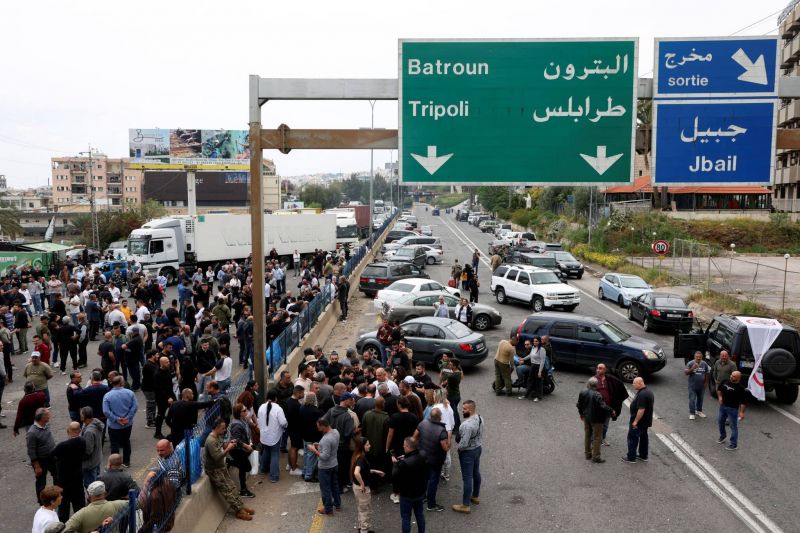
Supporters of the Lebanese forces block the highway leading to Jbeil after the disappearance of Pascal Sleiman, April 8, 2024. Photo Mohamed Azakir/Reuters
"Political until further notice.” As soon as the death of Pascal Sleiman, head of the Lebanese Forces’ Jbeil district office, was announced — some 24 hours after his disappearance — his party immediately questioned the official version of events.
While the Lebanese Army indicated on Monday evening that, according to the results of a preliminary investigation, the victim "was killed by gang members who were trying to steal his car," the Lebanese Forces (LF) see in this incident more than an incidental criminal act.
Supporters of the Christian party and, to a lesser extent, its cadres point the finger at Hezbollah, claiming the party, currently fighting Israel across Lebanon’s southern border, was trying to send a message to its opponents in the context of heightened political polarization. Supporting its own version of events, LP has pointed to various aspects of the official version of events that it sees as flawed.
What happened
On Sunday, at around 6:15 p.m., Pascal Sleiman (originally from Mayfouk), had his car run off the road on the outskirts of Kharbed, in Jbeil district, as he was returning home from a relative’s funeral. Four men, driving in another car, blocked his path, forcing him to come to a halt. According to Interior Minister Bassam Mawlawi, the four men were in a car they had stolen a few days prior in Rabieh, in the Metn region. The car was later discovered in northern Lebanon, not far from Tripoli.
A Monday evening statement released by the Lebanese Army claimed that Sleiman was killed while the men were trying to steal his car. He had resisted the initial attack, so the account goes, and the men had hit him in the face and head with the butts of their revolvers in an attempt to subdue him and placed him in the trunk of his own car, a military source told L’Orient-Le Jour. The four men then split into two groups, each pair driving one of the two stolen vehicles, the army says.
According to the information shared with L’Orient-Le Jour, the car stolen from Rabieh was abandoned near Tripoli, while the victim’s car was found in Syrian territory and eventually returned to Lebanon by Syrian authorities.
Pascal Sleiman's body was found on Monday evening in Syria, in the governorate of Homs, where Hezbollah wields considerable influence, and handed over to the Lebanese authorities at around 4 p.m. on Tuesday.
Lebanese authorities arrested seven Syrians suspected of being involved in the murder, including four people who the army claims are the kidnappers themselves. “Three of them were no longer in Lebanon,” the military source revealed, “but were lured back to Lebanese territory via a special intelligence operation.”
“They belong to a group specializing in car theft between Lebanon and Syria, which includes nationals from both countries," a security source told OLJ.
Shady areas
Not everyone is convinced by this account, and many questions remain unanswered. "There are a number of grey areas," says Ashraf Rifi, former head of the Internal Security Forces and a current member of parliament who opposes Hezbollah.
He explains: "If the kidnappers simply wanted to steal Pascal Sleiman's car, why did they kill him and take his body to Syria? And if, as some suggest, they kidnapped him for ransom, why did they kill him? Generally speaking, when kidnapping for money, it's in the kidnappers' interest to keep the victim alive."
A former high-ranking security official, who spoke to L’Orient-Le Jour on condition of anonymity, agreed with the criticisms. “It's true that it's hard to see why the gang kidnapped the victim if it was just an attempt to steal his car,” he admits. “The fact that he was kidnapped indicates that the kidnappers were more interested in his person, perhaps because he is an LF executive, but above all because he is a senior executive in a bank." Until his death, Pascal Sleiman was in charge of IT at Byblos Bank, one of the country's largest banks.
Lebanese banks started imposing illegal capital controls back in October 2019, barring tens of thousands of individuals — many of them Syrians — from accessing their deposits. Many depositors, feeling they had no leverage, resorted to violence. Several people have carried out bank holdups just to acquire their own savings.
"It may be that Syrians or Lebanese with a grudge against the bank or against Mr. Sleiman wanted to take revenge by kidnapping him in order to blackmail him," says the former security official. He also acknowledged that the seven suspects arrested and interrogated by the army over the last 48 hours, had given testimonies that contain “inconsistencies.”
In a speech on Monday, Hezbollah Secretary General Hassan Nasrallah strongly criticized the Lebanese Forces and its allies for being so quick to point the finger at his movement. "This affair has nothing to do with politics or Hezbollah. It turned out to be the work of a gang of Syrians and Lebanese who wanted to obtain a ransom," he claimed.
An LF spokesperson, contacted by OLJ, refuted Nasrallah’s version of events. "No ransom has been demanded from Pascal Sleiman's family, nor is it clear when Pascal Sleiman was killed,” said Charles Jabbour.
The anonymous security source explained that the exact sequence of events is crucial to understanding the motives. “One of the questions that absolutely must be answered in order to determine the motives for the crime is the exact time of the victim's death,” he said. “If he was killed at the time of the kidnapping, it's hard to see why the kidnappers took him all the way to Homs.”
However, the Lebanese Army, which is running the investigation, stands by its findings. “What happened was that once the victim had been knocked unconscious, the kidnappers wanted to drop him off somewhere in North Lebanon, so that he wouldn't be able to rush to a police station if he regained consciousness, giving them time to cross the border," the military source says, defending the army’s interpretation.
“Near Tripoli, the gang members wanted to swap cars to cover their tracks and opened the trunk. Pascal Sleiman was awake. He tried to resist again, and that's when they killed him.” According to the army, The kidnappers were worried that someone would find Sleiman’s body and alert the authorities, so they took him to Syria in his car via an illegal border crossing between Hermel and Akkar, leading to Homs.
Political, despite everything
The military believes this is not the first time this “gang” has carried out this sort of operation. The group is said to be led by a "mastermind" gang leader hiding in Syria.
"They often steal cars in Lebanon and sell them across the border at low prices. What happened on Monday is the kind of incident that can unfortunately happen to anyone," the anonymous military source told OLJ. “Except that, this time, the victim wasn't just anyone.”
Within the security apparatus, the political angle is categorically ruled out. “Admittedly, the version presented by the army has its flaws, especially as the investigation is still in a preliminary phase," a current security official says. “What is clear, however, is that there is no indication that the murder was politically motivated. Pascal Sleiman's profile — a discreet man who was well-liked by everyone, even by opponents of the LF — does not fit this kind of motive. If someone wanted to send a message to the LF, they would have targeted a more well-known figure."
Although the Lebanese Forces, headed by Samir Geagea, initially refuted the army's version on Monday evening, saying that the murder was "a political assassination until proven otherwise,” it no longer rules out the possibility of a "heinous crime."
“The investigation must continue, and then we'll see," Charles Jabbour says. However, even if the version presented by army intelligence finally convinces them, the LF says it will stand by its conviction that Hezbollah is to blame.
“Let's admit for a moment that it was a gang of car thieves who killed our dear Pascal," Jabbour says. “Isn't it Hezbollah that is preventing the building of a state capable of fighting crime in the country? Isn't it also Hezbollah that prevents us from controlling the border with Syria, so that it can maintain its supply lines from Iran? Finally, isn't Hezbollah, which refuses to allow the state to have a monopoly on legitimate violence, responsible for the proliferation of weapons in Lebanon?"
The LF seems determined to hold Hassan Nasrallah's party responsible, albeit indirectly, for Pascal Sleiman's murder. Especially as it becomes increasingly difficult for Nasrallah to explain why his opponents so often disappear under mysterious circumstances.
This article originally appeared in French on L'Orient-Le Jour. English translation by Amelia Hankins.

